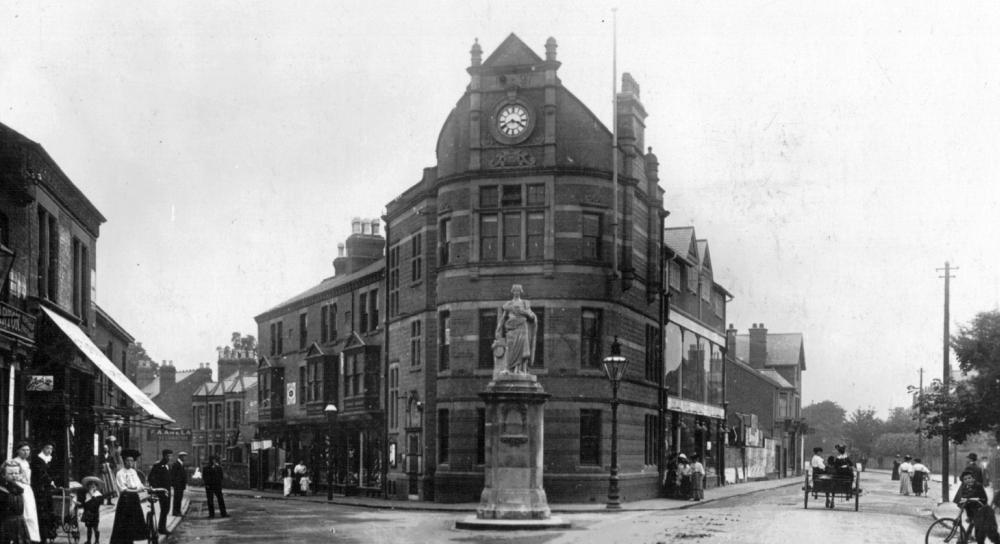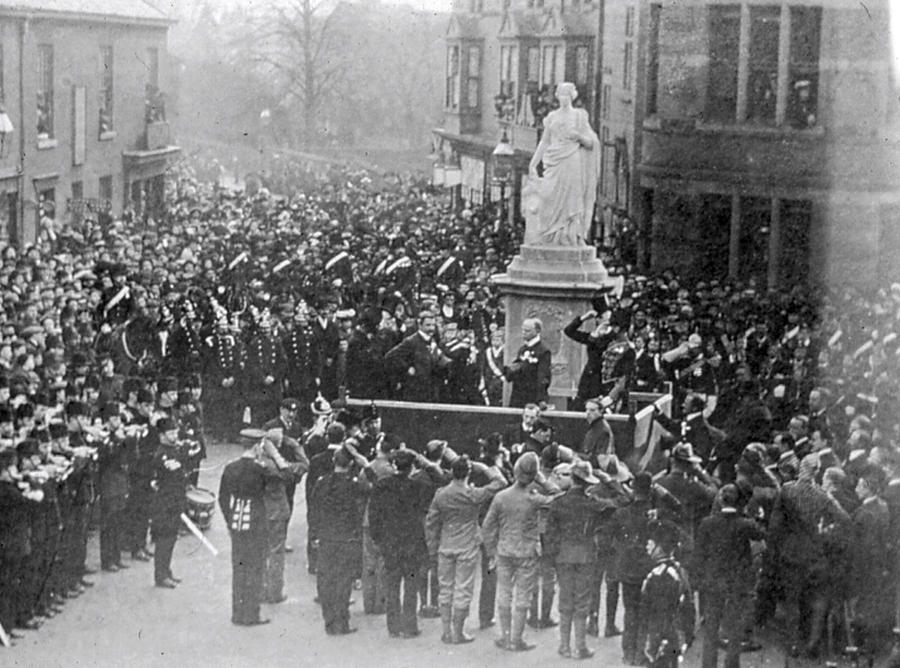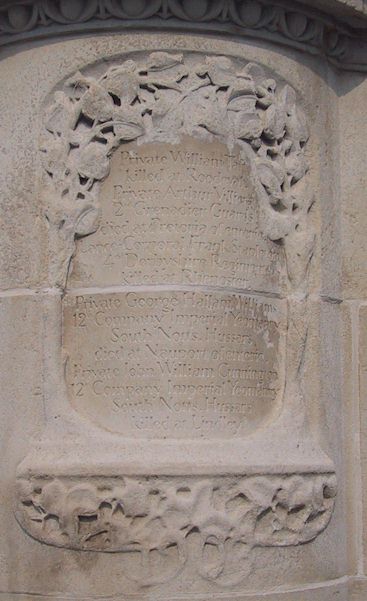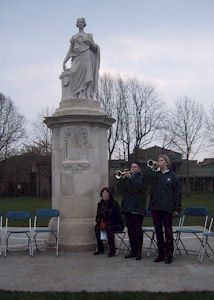| Home Topics Memorials Miscellany Transcripts References Family History Glossary Latest Beeston Blog About us | Site Search |
|
The Boer War Memorial at Beeston -The Boar War Memorial, that now stands in Broadgate Park, was erected in memory of those of those from Beeston who died in the Second Boer War that was fought between 1899 and 1902. As the above picture shows, it stood originally in Beeston Square, from its unveiling in 1904 until increasing traffic lead to it being moved to what was then Broadgate Recreation Ground in 1934. In the picture, Chilwell Road is on the right of the Council Office building and Church Street, on the left, then opened into Beeston Square.  The Second Boer War – often known as the South African War – began in October 1899 and was between Britain together with its Empire, which controlled much of South Africa and the Boers (the term means ‘farmers’), the Afrikaans-speaking population, descended from early Dutch East India Company settlers who had, earlier in the century, colonised the Orange Free State and the Transvaal and had settled there, outside the scope of British control. However, by 1899, the arrival of large numbers of ‘unwelcome visitors’ to the Boer republics, largely ‘foreigners’ - mainly British from Cape Colony - increased tensions between the British and Afrikaans. Many of the incomers were seeking a share of the benefits of the massive gold resources had been discovered in the Transvaal in 1886, and was now being exploited on a large scale by the incomers and the boer’s self-governing rights were being threatened. When attempts to negotiate a compromise failed and, a state-of-war was declared by the Boers on 11 October 1899, the Boer’s, having taken a surprise initiative, certainly achieved the upper hand in the early stages of the war, They also, at this stage, had the advantage of a better knowledge of the terrain and a well-equipped fighting force, despite its limited size – a combination that took the British, led by General Sir Redvers Butler, time to counter In the early months. Very early on, the Boars besieged the British garrisons at Ladysmith – where the British suffered heavy losses before facing a siege of several months duration – at Mafeking – where Robert Baden-Powell, who later went on to found the scout movement, was innovative and successful in leading the defence of the town during the 217 days that the siege lasted - and Kimberley – which lasted for 124 days. While the sieges were not really a successful strategy for the Boers, the attempts by the British to break them led to considerable casualties amongst their troops. A new initiative was called for and Buller was replaced by a new Command led by Field Marshall Frederick Sleigh Roberts, together with a strong group of supporting senior officers including Lord Kitchener as his chief of staff. His tactics during the early part of 1900 were successful in the relief of the last of the sieges and a forced surrender of 4000 of the enemy. And he went on to further aggressive attacks, with overall successes, such that, by the end of 1900, with all the republic’s towns in British hands. - although his ‘scorched-earth’ policy and the use of ‘concentration camps’ had been controversial. On 12 December 1900, he handed over command to Lord Kitchener and returned to England with acclaim. In the event, however, the boers did not give up easily and they were to continue with guerilla tactics for another fifteen months until, in May 1902, peace returned again and the Boer republics came under British control. But, omce more for the British troops, as can be seen from the details of the Beeston casualties, it had been a way of desease as well as injury. The memorial, in Portland stone, takes the form of a symbolic figure of Hope, holding a wreath in one hand while the other rests on a sacrificial altar of the early Roman type. It was the winning entry in an open competition, designed by the Nottingham based architect, Arthur Marshall ARIBA who was a particularly well respected and prolific Nottingham architect. His local work included Bagthorpe Workhouse (now incorporated into the Nottingham City Hospital campus), the Midland Eye Infirmary and a large block of offices and shops on King Street, Nottingham. He was also an extremely talented and highly respected amateur photographer who won awards, not only locally and nationally but also in international competitions. By this time he and his family had made their home at ‘Woodside’ on the main road in Chilwell but they later moved to Lockington in Derbyshire and lived there up to his death in 1915, aged 56. The memorial was financed by public subscription and, as we have seen, was positioned originally in Beeston Square, prominently in front of what was then the Council Office building. The task of organising the raising of the cost of the memorial and organising its construction was the work of a committee led by Henry William Cooper, a lace manufacture, then living at The Hall on Middle Street, Beeston and in business in Draycott. His Vice-Chaiman was the Civic Engineer, Charles Mason, George Fellows of Beeston Fields, was the Honorary Treasurer and Arthur Kirkland, the local Rate Collector, served as the Honorary Secretary. They led a group of 22 committee members – including the Vicar, Rev Beckton – who, collectively, were successful in raising the necessary funds – some £200 – and organising its positioning and opening. The unveiling of the memorial took place on Saturday, 13th February 1904 and was performed by Colonel Lancelot Rolleston DSO (later Colonel Sir Lancelot Rolleston KCB, CBE, TD, Dl JP), of Watnall Hall, who had taken The South Notts Hussars to South Africa to form the 12th Company, 3rd Battalion Imperial Yeomanry. There, he had led a charge against the Boers during which he had been shot in the arm and it was particularly poignant that he had lain injured alongside one of the men named on the memorial – presumably Private Cunnington.  Colonel Rolleston was supported at the unveiling by Henry.W Cooper (Chairman of the memorial committee), Lieutenant-Colonel Browell (likely, William Basil Browell who had also served in the South African War), and others. As can be seen partly in the above image, it was watched by a large crowd which completely filled the area of the Square in all directions. It included veterans, military personnel, groups from local organisations. Military musicians and, it is said, the local Boys Brigade band, played the music. The inscription on the front of the base of the memorial reads :
Private William Taft, killed at Battle of Roodewal (Rhenoster River) on 7 June 1900 - apparently the son of William and Ellen Taft, who was born in July 1884. This means that, at about 16, he was probably the youngest of the five men who died.
|
|
||||||||||||||
|
|
||||||||||||||||




